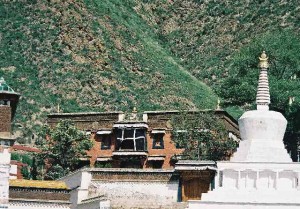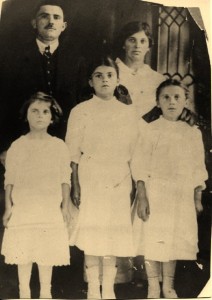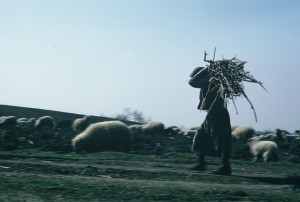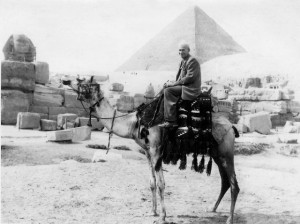Sit with your friends, don’t go back to sleep.
Don’t sink like a fish to the bottom of the sea.
Surge like an ocean,
Don’t scatter yourself like a storm.
Life’s waters flow from darkness.
Search the darkness, don’t run from it.
Night travelers are full of light,
And you are, too; don’t leave this companionship.
Be a wakeful candle in a golden dish,
Don’t slump into the dirt like quicksilver.
The moon appears for night travelers,
Be watchful when the moon is full.
~~Search the Darkness
~~Rumi
It is the evening of the day before. I’m walking back from Xia He. It’s been a nice evening walking along its streets poking my nose in shops and looking at Tibetan this and that. I buy some tiny paper prayer flags printed with a Wind Horse… some incense. I can’t walk anymore.  My feet have had it. The hotel is an hour away and I am sure I won’t get there before night falls. The mountain is on one side of me. There are cuckoos far up in the trees and I am listening for them. On the other side of the road is the river. On its far side the Lebrang Monastery woven of temples and libraries… courtyards, alleys and outbuildings. The mountains are black against the starlit sky when I cross the river again and turn off down the road to the hotel… the stars have come out… the icy air cuts through me and I am shivering.
My feet have had it. The hotel is an hour away and I am sure I won’t get there before night falls. The mountain is on one side of me. There are cuckoos far up in the trees and I am listening for them. On the other side of the road is the river. On its far side the Lebrang Monastery woven of temples and libraries… courtyards, alleys and outbuildings. The mountains are black against the starlit sky when I cross the river again and turn off down the road to the hotel… the stars have come out… the icy air cuts through me and I am shivering.
The shadows were long… the sun still bright as I had set off to Xia He in the late afternoon. Three Tibetan cronies are sitting on low rocks in the sun on the way. They invite me over and I sit with them for a while. The sun is warm and I close my eyes and raise my face to it. The four of us are sunflowers seeking the golden light, planted there on our teetering rocks. I wonder who these women are as they chatter about me in Tibetan. They are brown and shriveled… faces like walnuts. They seem like apparitions… maybe if I go back and come again, they will have disappeared. As it turns out, they are sisters. I’m fascinated with one sister. She has drawn stars on her arms with the tip of a rock. She laughs and tells me that she did it just because she wanted stars on her arm… and she seems just that… earth joined to sky… the same. She takes my hand in hers and smoothes the rough leather of her palm over the back of my soft one. Her hand is weathered and dry… twisted from hard work. We sit there holding hands speaking a little Chinese that sounds out-of-place on our tongues. As the coolness of the evening arrives, it is time to go. The one with the stars on her arms tells me to come along with her. We walk arm-in-arm on the road toward Xia He. She talks all the time, but I have no idea what she is saying.  Later, she turns off and climbs up the hill toward the houses made of mud and brick. She tells me in Chinese she is going home to cook dinner.
Later, she turns off and climbs up the hill toward the houses made of mud and brick. She tells me in Chinese she is going home to cook dinner.
Walking on this road to Xia He, I am lost in thoughts of how they feel… these recent hand-holdings.
There was a time in my life when I had been loved. I was an apple of many eyes. I thought I would live that way forever. I did not. Everyone who loved me best in the world is dead.
I muse back to my grandmother… Julie… Louise… a generation of strong Romanian women… a dark tale of the three innocent daughters. All three had been forced into cruel family-arranged marriages to wealthy men when they were just 15 years old. My grandmother and Aunt Julie had divorced, but my Aunt Louise had a brutal life.
Louise’s husband had whisked her back to Romania straightaway. He had bought a big house in the village. He had run up the Romanian flag the same day. He had beaten her so violently he had broken her teeth. She had cried for her mother and father. She would never see them again. The war came later. The women made the men run across the fields to hide in the woods when soldiers would come. Perhaps the soldiers might beat them and maybe rape them… but they would conscript the men. They were caught like rats and then taunted in a cage for years under the Soviets and Ceausescu. My aunt lived the life of the hammer and the sickle. She had cut hay and wheat in the field by hand… had covered fields of cauliflower with cheese cloth to protect them from the shriveling sun on the plain… had passed out from working so hard. The Russian trucks came to gather in the harvest and then drove away. They were left to starve and make do.
 I’ve looked at old family pictures. Louise is an elegant, beribboned girl… wise… older than her years. In later pictures she wears her babushka like a heavy stone on her head. She stands next to Toditsa, my great-great-grandmother. Toditsa is mean in her penury… as if the cup of tea is begrudged and should be drunk when it is cold and bitter. Louise’s clothes are dark. She still stands straight, but, later, she will be hunched from hard work. Her beauty will be gone at an early age, but the eyes that see through everything will remain.
I’ve looked at old family pictures. Louise is an elegant, beribboned girl… wise… older than her years. In later pictures she wears her babushka like a heavy stone on her head. She stands next to Toditsa, my great-great-grandmother. Toditsa is mean in her penury… as if the cup of tea is begrudged and should be drunk when it is cold and bitter. Louise’s clothes are dark. She still stands straight, but, later, she will be hunched from hard work. Her beauty will be gone at an early age, but the eyes that see through everything will remain.
 It will be different for my Aunt Julie. She will be beautiful of figure and face until late in her life, but her marriage will be shrouded in mystery and denial. She will move to Chicago with her husband, a man who owns a grocery store. She will bear him a daughter. She will flee her husband. Quite beautiful and knowing in the ways of women, she will remarry and blank out the past life. She will never tell her daughter about her father. Her daughter will scour telephone books from Chicago in the library searching out his name… one day she will discover that he is dead, but this beautiful young daughter so resembling her father will never see him face to face. She will mourn this loss of her father she will never know for a lifetime. She won’t ever be able to talk with her mother about it.
It will be different for my Aunt Julie. She will be beautiful of figure and face until late in her life, but her marriage will be shrouded in mystery and denial. She will move to Chicago with her husband, a man who owns a grocery store. She will bear him a daughter. She will flee her husband. Quite beautiful and knowing in the ways of women, she will remarry and blank out the past life. She will never tell her daughter about her father. Her daughter will scour telephone books from Chicago in the library searching out his name… one day she will discover that he is dead, but this beautiful young daughter so resembling her father will never see him face to face. She will mourn this loss of her father she will never know for a lifetime. She won’t ever be able to talk with her mother about it.
Unlike my Aunt Julie, my grandmother will tell me everything. My grandmother had been in love with a young boy when she was young. He would come to the farm and swing her on the gate while she would sing to him. Maybe they never even knew the joy of an innocent kiss when they were young. Life with Pete was not to be. She was forced to leave school after the eighth grade and married off to my grandfather.
My grandfather was already an alcoholic… a gambler… one taken to brawling. He was the wild son of rich Romanian peasants who owned a potato chip factory and real estate. My great-grandfather spent most of his time with other women. His wife, Catherine, spent most of hers over a crystal ball.
My grandmother will move to the huge street-front house in Detroit with parents and sons…daughters-in-law and babies… this place barren of love… bereft of joy. She will prepare to give birth to my mother in the small room she occupies with this drunken stranger, my grandfather. He will take her on his lap and explain how the baby will come out… he will buy her watermelon in winter to satisfy her cravings… he will come home drunk and urinate on her starched and pressed Romanian bed linens. In the morning he won’t remember.
She will give birth to my mother in that room. She will get consumption. One day, my great grandmother, my Bunitsa, will come. She will say, “Melie… get up. It’s time for you to come home.” She remarries in love, but she lives in sadness. She bears two sons… and then, this woman lives alone with her three children in a series of rented apartments. She works turns at the Rubber Works. She becomes muscle bound from walking the same path every shift to inspect the hose. She gets varicose veins. In her old age, she will always walk, but only slowly.
I have had a mother, but she will also be my mother. She will know that. She will cherish that… and so will I.
 By then, my great-grandparents will have become Pocoits… Romanian Pentecostals and will have repented for what they have done to their daughters… but the damage is already done… and the sins keep visiting themselves on all of us in one way or another. As the generations pass, these sins take different forms in all of us… sometimes they manifest themselves in denial and bitter ugliness… sometimes a wild winsomeness grows in the face of them… this Old Country life from a haunted past from a land of dubious borders like Romania… this secret folklore that beats us with sticks like beasts of burden that comes down from our family who plowed the fields like oxen. We will assume the Old Country will pass away with a steerage ticket to this new land of America. We will sing Romanian folk songs at Christmas and tell funny stories… we will immerse ourselves in nostalgia as if the want, the dirt and the smell, the numbing cold, the impoverished heart had never once been.
By then, my great-grandparents will have become Pocoits… Romanian Pentecostals and will have repented for what they have done to their daughters… but the damage is already done… and the sins keep visiting themselves on all of us in one way or another. As the generations pass, these sins take different forms in all of us… sometimes they manifest themselves in denial and bitter ugliness… sometimes a wild winsomeness grows in the face of them… this Old Country life from a haunted past from a land of dubious borders like Romania… this secret folklore that beats us with sticks like beasts of burden that comes down from our family who plowed the fields like oxen. We will assume the Old Country will pass away with a steerage ticket to this new land of America. We will sing Romanian folk songs at Christmas and tell funny stories… we will immerse ourselves in nostalgia as if the want, the dirt and the smell, the numbing cold, the impoverished heart had never once been.
Sometimes over my years I will think I hear the howling of a wolf at night and, in the early morning before the light, the tinkle of a sheep’s bell in the cote and I wonder if the wind has carried these sounds from so far away. I would like to say it is only the bell’s tinkle I want to hear… but it is also the wolf’s howl I long for. That is how the sins are visited upon me.
I will visit the room my mother was born in many years later. I will go there when I am 16 with my grandfather. The beautiful house will now be a tenement. My grandfather will own a tenement. I am an enlightened, cloistered girl. I am horrified that someone in my family could actually own a tenement in a ghetto. I will look at the room. I will cry on the inside for my mother… for my grandmother… imagine a young girl with sunken eyes and a thin chest, coughing blood, taking care of her baby in delicate, embroidered clothes. I won’t cry on the outside. My grandfather would only feel worse if I did.
My grandfather will tell me the story of his childhood… parents who left money for him to go to school in the Old Country. Instead, the friends will hire him out at age 7 to rich Bulgarians. He will work as a stable boy among an army of horses. He will be so hungry, he will eat oats intended for them. He will never go beyond the third grade, but he will learn to speak seven languages and learn how to use money to give him freedom.
 My grandfather will end up being my best friend. He will tell me that he has done so many bad things in his life that his plate can never be washed clean. He will tell me almost everything, but not all. I will learn the rest later in whispers behind closed doors and shifty glances from cousins when they will go no further in this knowledge that is my grandfather. I will learn to love the sinner with a love that understands visitations of sorrow. I will cook him plum compote, and he will tell me to add a lot of sugar to keep from reminding him of the starvation kisel-litsa of his youth. I will pick roses as he sleeps and leave them on his bedside table for him when he rubs his rheumy gray eyes into wakefulness. I will remain silent of sorrows all my own… but I know he will know of them without words. That will be my comfort.
My grandfather will end up being my best friend. He will tell me that he has done so many bad things in his life that his plate can never be washed clean. He will tell me almost everything, but not all. I will learn the rest later in whispers behind closed doors and shifty glances from cousins when they will go no further in this knowledge that is my grandfather. I will learn to love the sinner with a love that understands visitations of sorrow. I will cook him plum compote, and he will tell me to add a lot of sugar to keep from reminding him of the starvation kisel-litsa of his youth. I will pick roses as he sleeps and leave them on his bedside table for him when he rubs his rheumy gray eyes into wakefulness. I will remain silent of sorrows all my own… but I know he will know of them without words. That will be my comfort.
He will always be an alcoholic and drink late into the night. He will speak Romanian with my mother half the night over the glasses of good Scotch and Rye that he alone drinks… glasses that are never empty. Throughout the years I am growing up, I will awaken and come into his kitchen and sit there listening. Neither will ever make me go back to bed. Later I will return to bed and hear the soft lilt of the Romanian language as it carries me back to sleep. It is the one best memory of my early years, a light on a far-off ship floating in the sea of dread that I remember as my childhood. I swim toward that light and each time… every time… my grandfather, a sinner of the darkest sort, pulls me aboard and, thus, I never drown.
My Aunt Louise will return to us twice from Romania to visit. I will talk and laugh with the three almost everyday while she is there.  The four of us will become knit so closely that we will be all of a piece. I ask them what I will be like when I am old. It is my grandmother who replies, “Oh, my Will of the Wisp, you will be just like us.” I can only feel relief that I will have such love in me… that my young bitterness will be forged into love.
The four of us will become knit so closely that we will be all of a piece. I ask them what I will be like when I am old. It is my grandmother who replies, “Oh, my Will of the Wisp, you will be just like us.” I can only feel relief that I will have such love in me… that my young bitterness will be forged into love.
It is my Aunt Louise I remember as the Tibetan woman holds my hand… love that held my hand without expectation. I feel the imminent arrival of this love that having doubted itself, questioned itself, ceases thought and stands on an empty road waiting for all who pass by to give itself away. Waiting for this moment is the only way I’ve ever really known how to go on.
 Months later I am still thinking of the Tibetan woman with the stars scratched into her arm with a stone. I am wondering if Aunt Louise had such stars scratched into hers. I think perhaps she did. One day I will look down and there they will be on my arm. They will be mine… they will be ours… earth and sky …the same.
Months later I am still thinking of the Tibetan woman with the stars scratched into her arm with a stone. I am wondering if Aunt Louise had such stars scratched into hers. I think perhaps she did. One day I will look down and there they will be on my arm. They will be mine… they will be ours… earth and sky …the same.

